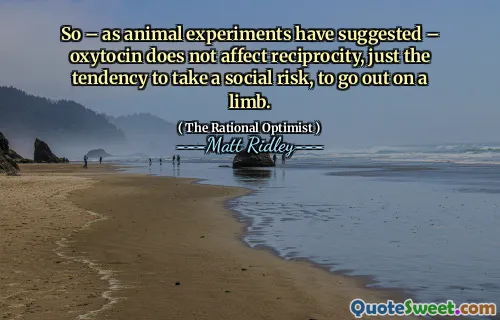
So – as animal experiments have suggested – oxytocin does not affect reciprocity, just the tendency to take a social risk, to go out on a limb.
This quote challenges a common misconception about oxytocin, often dubbed the 'love hormone' or 'bonding hormone.' Many have believed that oxytocin directly fosters reciprocal kindness and generosity in social interactions. However, the insights from animal experiments suggest a more nuanced picture. Instead of directly enhancing reciprocal behavior, oxytocin appears to influence our willingness to take social risks—essentially making us more prone to reaching out or showing vulnerability without necessarily guaranteeing mutual reciprocation.
Understanding this distinction is crucial because it sheds light on the complex nature of social bonding and cooperation. It implies that mechanisms like oxytocin may lower the emotional barrier for initiating social contact, but they do not by themselves ensure that our social efforts will be reciprocated positively. This aligns with real-world experiences where individuals might be more willing to make social gestures or act with trust when under the influence of certain neurochemicals, but the outcomes still depend heavily on other factors—context, individual differences, and reciprocal responses.
From a broader perspective, appreciating this distinction can refine how we interpret social behaviors and the potential applications of hormones like oxytocin in therapy or social interventions. It reminds us that biological influences are rarely straightforward in their effects; instead, they contribute to a nuanced mosaic of motivations and actions in social settings. This insight also opens up questions about how other neurochemical and psychological factors combine to regulate social reciprocity versus social risk-taking, which is fundamental in the fields of behavioral science, psychology, and neuroscience.
In the context of 'The Rational Optimist' by Matt Ridley, this reinforces the notion that human social progress hinges upon many interacting factors—not just biological predispositions, but also learning, culture, and environment—all underpinned by the willingness to take risks alongside the hope for mutual benefit.







